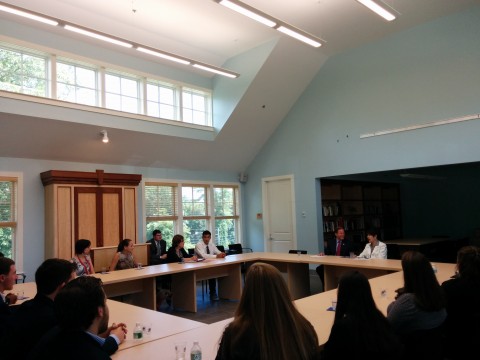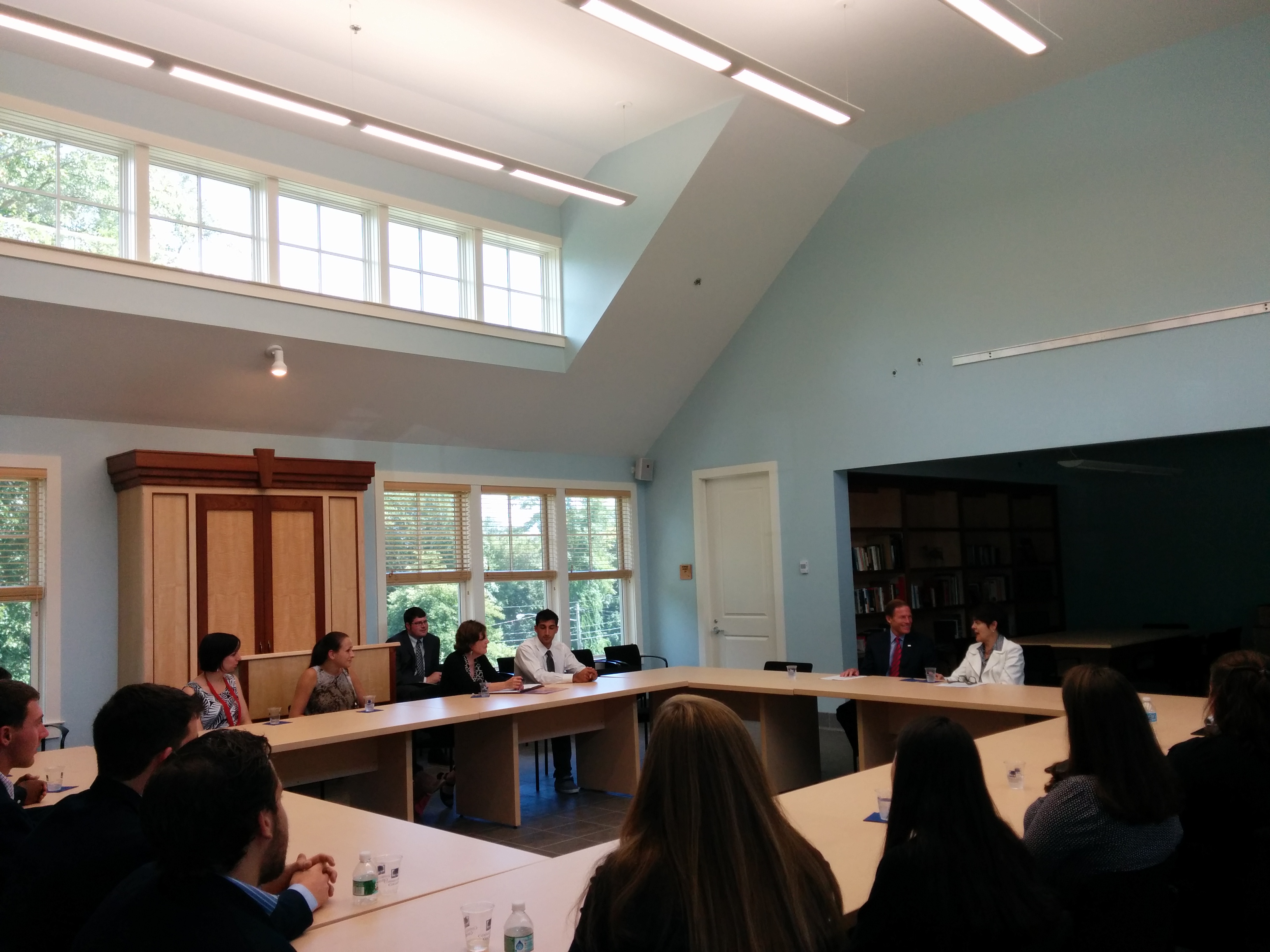On August 29, Senator Richard Blumenthal returned to Conn’s campus to continue round table discussions with student and staff leaders regarding Conn’s policies surrounding sexual assault and violence. Blumenthal continued to praise innovative programs such as Green Dot and Safety Net, as well as our attention to building a supportive community for survivors, intending to use them as “Best Practices” as he drafts a new bill that could potentially set a nation-wide standard for sexual assault prevention.
The bill in question focuses on issues of confidentiality, empowering survivors, “providing professional training in place of ad hoc programs” across the all university campuses and developing incentives for transparency when dealing with cases involving Title IX offenses.
“Laws can change. Laws can be made better. But the culture also has to change,” stated Senator Blumenthal.
A wide range of campus leaders were in attendance, from President Katherine Bergeron and Dean Denard, to members of the men’s group 1 in 4, Affirmative Action Officer Judy Kirmmse, to Darcie Folsom and her dedicated interns. Everyone agreed that Conn’s programs in developing a population of active bystanders that are better able to assess and intervene in difficult situations that put their peers in danger.
An interesting point brought up by Blumenthal was the efforts, conscious or unconscious, to build a strong relationship between the Think S.A.F.E. Project and different sports teams on campus.
“Often it is the Head of the Athletic Department that is given jurisdiction in situations where student athletes are accused of sexual assault,” noted Blumenthal.
It is an especially poignant observation considering recent allegations made at other local universities, such as UCONN, and on an increasing number of campuses across the nation. The fact that members of the men’s and women’s soccer, lacrosse, and hockey teams are committed to prevention programs such as Green Dot, is innovative in itself.
Another topic of discussion was the initiatives taken to protect and inform the Class of 2018 as the newest members of our community. Folsom and her team have made increasing efforts to introduce Green Dot and other sexual assault prevention and treatment options available to students upon arrival.
“After the first introduction to Green Dot, 38% of the incoming class was registered for the next training,” said Bettina Weiss ’15, an intern in Folsom’s office, a testament to the fact that the program will undoubtedly continue to grow in the coming years.
None of this has gone unnoticed by Blumenthal. In June, he invited Folsom to join a round table discussion in Washington D.C., hosted by U.S. Senator Claire McCaskill. Throughout the discussion, he continued to draw out answers from students and staff as to how Conn’s policies have influenced the experience of being a part of our small liberal arts community. While it is clear there is always work to do on the front of developing prevention methods, the general consensus seems to be that these trainings are useful in all facets of student life, and reflect a greater sense of mutual responsibility.
“Going through Green Dot training gives you the confidence to analyze tough situations and act on them” Lucas Corrubia ’15, told Blumenthal.
In the wake of the previous day’s Convocation festivities, the natural connection was made between President Bergeron’s speech that called the college community to maintain our foundations of inclusivity and openness as we begin the coming school year.
“It is important that we change the conversation, and that it reflects what it is that Conn is all about,” said Bergeron.
While the drafting of official legislation in D.C. is only in the beginning stages of a long term process, Blumenthal has been working in a bipartisan effort with Senate colleagues from both sides of the aisle to begin making progress on a national level. In doing this, he claims that Conn has come up in several of his conversations with policy-makers, and even the United States Attorney General.
“I am here to listen,” concluded Blumenthal.

Senator Blumenthal speaking with Katherine Bergeron during a second round table discussion about Connecticut College’s policies and programs for sexual assault prevention.











While I am delighted to see the great coverage of Senator Blumenthal’s visit and the well deserved praise that Connecticut College is getting for its programs combatting sexual assault, I continue to be surprised that the whole story about how the College ended up in a leadership position on this issue really happened. Yes, the programs now operating were funded by a grant from the Department of Justice, but getting to the place that the College applied for that grant was no small matter. The Department of Gender & Women’s Studies — our students, faculty and staff — worked over many years to document the issue, support its victims, study possible solutions, and mobilize the campus around them. First GWS initiated a Training in Transformation class taught by Cybele Locke that in its first year served on a Think Tank on Sexual Assault organized by Dean Millstone. In our classes we studied women’s human rights as those theories and practices had emerged through the United Nations particularly its CEDAW Treaty (Convention to Eliminate All Forms of Discrimination Against Women). A GWS senior seminar focused on Gender and Human Rights and helped to organize through the department a major campus conference, “The Right to Security of Person: Ending Campus Sexual Violence” through a Human Rights Framework (the conference title comes from the 3rd article of the Universal Declaration of Human Rights). We brought in experts on the subject, engaged students, the counseling service, law enforcement, and top administrators. President Higdon was very open from the beginning to these efforts and all of this organizing laid the groundwork for the Dean of Student Life Office to apply to the Department of Justice and eventually get the grant that has led to such exemplary work. Surely this part of the story deserves to be told and makes the College’s accomplishments both more impressive and more accessible to other campuses who are now encouraged to model on it. Perhaps The Voice could tell this story in a way that begins to impact the current narrative. There is plenty of documentation I could point you towards. Thanks.
Mab Segrest, retired Professor of Gender & Women’s Studies 2002-2014.
As my former professor Mab Segrest so eloquently points out in the reply above, there seems to be a huge part missing from the narrative campus efforts to end sexual assault. It is not only remiss to ignore the hard work of so many students, faculty and staff that laid the groundwork to make all of these exciting changes happen, but it also portrays a story that is not complete.
In the spring of 2008, I was in Mab Segrest’s senior seminar “Gender and Human Rights,” along with Emily DeClue ‘08, Caroline Denham ‘08, Kaitlin Morse ‘08, and Sarah Trapido ‘08. As part of our final assignment, the class co-authored a paper entitled, “The Vulnerability of Gendered Terrains: How Safe Are Dorms for Women?” We focused on a few questions: Why do assaults on college women seem to occur so far outside the law? What is the relationship between violence in the dorm and violence in the home? To answer these questions, we sought to theorize “the state”—be it Connecticut College, the state of Connecticut, or the United States—and apply feminist critiques of its dichotomy of the public/private spheres to see what the state’s responsibilities are in allowing or preventing sexual violence. During the same semester, we also helped Mab Segrest organize a conference: “THE RIGHT TO SECURITY OF PERSON: Creating a Campus Free of Sexual Assault,” in order to raise these issues publicly on campus. At the conference, the seminar presented the aforementioned paper. Finally, as a class we met with former president Higdon and offered recommendations for the school to implement vis-à-vis sexual assault on campus. I thought President Higdon and senior administrators were sympathetic to our cause and point of view. I highlight these events as a reminder that this very difficult and emotional work happened from the ground up, a fact that The Voice article misses altogether.
As an undergraduate, I was also co-President of the Feminist Majority, a continuous member of “Take Back the Night,” and a performer in the annual Vagina Monologues. I graduated Connecticut College in 2009 with a double major in Gender and Women’s Studies and Government, and a minor in English.
Best,
Yalidy Matos ‘09